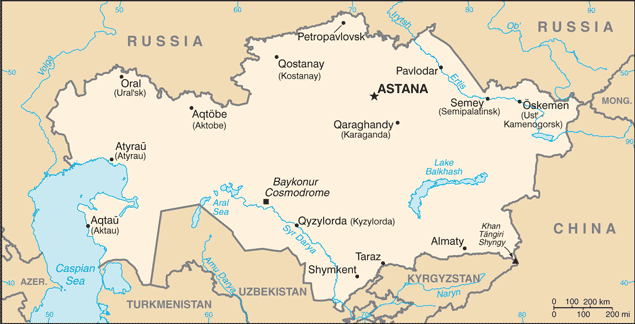Kazakhstan
 Kazakhstan is country of Europe located in east Europe - partly in Asia.
Kazakhstan is country of Europe located in east Europe - partly in Asia.
Details
| Official Name: | Republic of Kazakhstan |
| Capital: | Astana |
| Total area: | 2 724 900 km2 |
| GDP per capita: | $13,892 |
| Native Language: | Kazakh, Russian |
| Government: | Dominant-party unitary presidential state |
| Population: | 16,967,000 |
| Major Religion: | Islam, Christianity |
| Monetary Unit: | Tenge (KZT) |
Kazakhstan, officially the Republic of Kazakhstan, is a country in Central Asia, with its smaller part west of the Ural River in Eastern Europe. Kazakhstan is the world's largest landlocked country by land area and the ninth largest country in the world; its territory of 2,727,300 square kilometres (1,053,000 sq mi) is larger than Western Europe. It is neighbored clockwise from the north by Russia, China, Kyrgyzstan, Uzbekistan, and Turkmenistan, and also borders on a large part of the Caspian Sea. The terrain of Kazakhstan includes flatlands, steppe, taiga, rock canyons, hills, deltas, snow-capped mountains, and deserts. With 17 million people (2013 estimate) Kazakhstan has the 62nd largest population in the world, though its population density is less than 6 people per square kilometre (15 per sq. mi.). The capital is Astana (previously Almaty).
Economy
Buoyed by high world crude oil prices, GDP growth figures were comprised between 8.9% and 13.5% from 2000 to 2007 before decreasing to 1–3% in 2008 and 2009, and then rising again from 2010. Other major exports of Kazakhstan include wheat, textiles, and livestock. Kazakhstan predicted that it would become a leading exporter of uranium by 2010, which has indeed come true.
The inflation figures are high: 2005, 7.6%; 2006, 8.6%; 2007, 18.8%; 2008, 9.5%; 2009, 6.2%.
Since 2002, Kazakhstan has sought to manage strong inflows of foreign currency without sparking inflation. Inflation has not been under strict control, however, registering 6.6% in 2002, 6.8% in 2003, and 6.4% in 2004.
In 2000, Kazakhstan became the first former Soviet republic to repay all of its debt to the International Monetary Fund (IMF), seven years ahead of schedule. In March 2002, the U.S. Department of Commerce granted Kazakhstan market economy status under U.S. trade law. This change in status recognized substantive market economy reforms in the areas of currency convertibility, wage rate determination, openness to foreign investment, and government control over the means of production and allocation of resources.
In September 2002, Kazakhstan became the first country in the CIS to receive an investment grade credit rating from a major international credit rating agency. As of late December 2003, Kazakhstan's gross foreign debt was about $22.9 billion. Total governmental debt was $4.2 billion, 14% of GDP. There has been a noticeable reduction in the ratio of debt to GDP. The ratio of total governmental debt to GDP in 2000 was 21.7%; in 2001, it was 17.5%, and in 2002, it was 15.4%.
Immigration and residency
If you are interested in moving to the countries, either with a residence permit or by acquiring a citizenship, please contact us, and also get acquainted with the relevant migration documents.